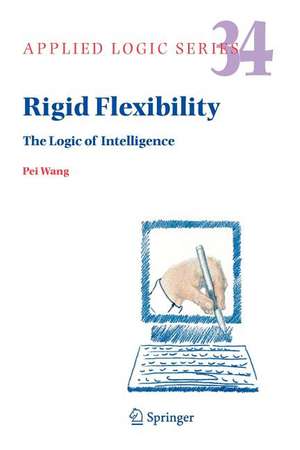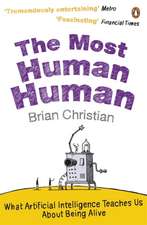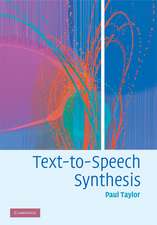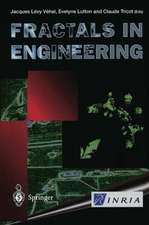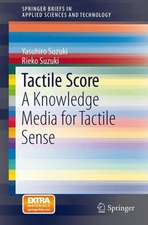Rigid Flexibility: The Logic of Intelligence: Applied Logic Series, cartea 34
Autor Pei Wangen Limba Engleză Paperback – 10 oct 2011
| Toate formatele și edițiile | Preț | Express |
|---|---|---|
| Paperback (1) | 1278.35 lei 43-57 zile | |
| SPRINGER NETHERLANDS – 10 oct 2011 | 1278.35 lei 43-57 zile | |
| Hardback (1) | 1284.65 lei 43-57 zile | |
| SPRINGER NETHERLANDS – 23 aug 2006 | 1284.65 lei 43-57 zile |
Din seria Applied Logic Series
- 18%
 Preț: 1114.65 lei
Preț: 1114.65 lei - 20%
 Preț: 996.22 lei
Preț: 996.22 lei - 18%
 Preț: 957.13 lei
Preț: 957.13 lei - 15%
 Preț: 646.75 lei
Preț: 646.75 lei - 18%
 Preț: 1225.62 lei
Preț: 1225.62 lei - 18%
 Preț: 956.33 lei
Preț: 956.33 lei - 18%
 Preț: 957.44 lei
Preț: 957.44 lei - 18%
 Preț: 959.98 lei
Preț: 959.98 lei - 15%
 Preț: 639.73 lei
Preț: 639.73 lei - 18%
 Preț: 945.79 lei
Preț: 945.79 lei - 18%
 Preț: 949.55 lei
Preț: 949.55 lei - 18%
 Preț: 952.40 lei
Preț: 952.40 lei - 15%
 Preț: 637.13 lei
Preț: 637.13 lei - 15%
 Preț: 639.59 lei
Preț: 639.59 lei - 20%
 Preț: 1001.86 lei
Preț: 1001.86 lei - 15%
 Preț: 645.28 lei
Preț: 645.28 lei - 18%
 Preț: 957.32 lei
Preț: 957.32 lei - 15%
 Preț: 649.06 lei
Preț: 649.06 lei - 18%
 Preț: 953.20 lei
Preț: 953.20 lei - 15%
 Preț: 589.65 lei
Preț: 589.65 lei - 15%
 Preț: 648.74 lei
Preț: 648.74 lei - 18%
 Preț: 1117.99 lei
Preț: 1117.99 lei - 20%
 Preț: 338.03 lei
Preț: 338.03 lei - 18%
 Preț: 956.03 lei
Preț: 956.03 lei - 18%
 Preț: 953.65 lei
Preț: 953.65 lei
Preț: 1278.35 lei
Preț vechi: 1597.94 lei
-20% Nou
Puncte Express: 1918
Preț estimativ în valută:
244.62€ • 256.04$ • 203.59£
244.62€ • 256.04$ • 203.59£
Carte tipărită la comandă
Livrare economică 31 martie-14 aprilie
Preluare comenzi: 021 569.72.76
Specificații
ISBN-13: 9789048172641
ISBN-10: 9048172640
Pagini: 432
Ilustrații: XVIII, 402 p.
Dimensiuni: 160 x 240 x 23 mm
Greutate: 0.6 kg
Ediția:2006
Editura: SPRINGER NETHERLANDS
Colecția Springer
Seria Applied Logic Series
Locul publicării:Dordrecht, Netherlands
ISBN-10: 9048172640
Pagini: 432
Ilustrații: XVIII, 402 p.
Dimensiuni: 160 x 240 x 23 mm
Greutate: 0.6 kg
Ediția:2006
Editura: SPRINGER NETHERLANDS
Colecția Springer
Seria Applied Logic Series
Locul publicării:Dordrecht, Netherlands
Public țintă
ResearchCuprins
Theoretical Foundation.- The Goal of Artificial Intelligence.- A New Approach Toward AI.- Non-Axiomatic Reasoning System.- The Core Logic.- First-Order Inference.- Higher-Order Inference.- Inference Control.- Comparison and Discussion.- Semantics.- Uncertainty.- Inference Rules.- NAL as a Logic.- Categorization and Learning.- Control and Computation.- Conclusions.- Current Results.- NARS in the Future.
Recenzii
From the reviews:
"Rigid Flexibility presents a new theory of cognition. As such it is devoted to the general research for Artificial Intelligence (AI), in contrast to a focus of other AI research that is focusing on solving specific reasoning problems such as planning or learning for example. … The review of the principles and assumptions underlying the various streams of AI research make this book very interesting to read and enable the reader to easily compare the presented theory with other existing approaches." (Jana Koehler, Zentralblatt MATH, Vol. 1122 (24), 2007)
"Rigid Flexibility presents a new theory of cognition. As such it is devoted to the general research for Artificial Intelligence (AI), in contrast to a focus of other AI research that is focusing on solving specific reasoning problems such as planning or learning for example. … The review of the principles and assumptions underlying the various streams of AI research make this book very interesting to read and enable the reader to easily compare the presented theory with other existing approaches." (Jana Koehler, Zentralblatt MATH, Vol. 1122 (24), 2007)
Textul de pe ultima copertă
This book provides the blueprint of a thinking machine.
While most of the current works in Artificial Intelligence (AI) focus on individual aspects of intelligence and cognition, the project described in this book, Non-Axiomatic Reasoning System (NARS), is designed and developed to attack the AI problem as a whole.
This project is based on the belief that what we call "intelligence" can be understood and reproduced as "the capability of a system to adapt to its environment while working with insufficient knowledge and resources". According to this idea, a novel reasoning system is designed, which challenges all the dominating theories in how such a system should be built. The system carries out reasoning, learning, categorizing, planning, decision making, etc., as different facets of the same underlying process. This theory also provides unified solutions to many problems in AI, logic, psychology, and philosophy.
This book is the most comprehensive description of this decades-long project, including its philosophical foundation, methodological consideration, conceptual design details, its implications in the related fields, as well as its similarities and differences to many related works in cognitive sciences.
While most of the current works in Artificial Intelligence (AI) focus on individual aspects of intelligence and cognition, the project described in this book, Non-Axiomatic Reasoning System (NARS), is designed and developed to attack the AI problem as a whole.
This project is based on the belief that what we call "intelligence" can be understood and reproduced as "the capability of a system to adapt to its environment while working with insufficient knowledge and resources". According to this idea, a novel reasoning system is designed, which challenges all the dominating theories in how such a system should be built. The system carries out reasoning, learning, categorizing, planning, decision making, etc., as different facets of the same underlying process. This theory also provides unified solutions to many problems in AI, logic, psychology, and philosophy.
This book is the most comprehensive description of this decades-long project, including its philosophical foundation, methodological consideration, conceptual design details, its implications in the related fields, as well as its similarities and differences to many related works in cognitive sciences.
Caracteristici
One of a small number of books that try to give a constructive explanation of intelligence/cognition/thinking as a whole A novel and original approach that challenges all dominating theories Theoretical discussions combined with design details Unified solutions to many traditional problems in several fields (artificial intelligence, logic, psychology, philosophy, linguistics, …)
